
NHS Triumphs in Japan Conference
Friday,
November 03, 2006 ![]()
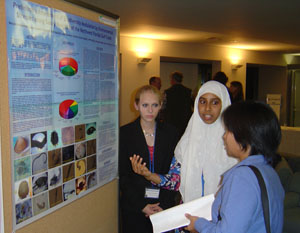 Students Maryam Mohammed and Cynthia Mylum answer questions about the organisms they tracked. NHS was the only high school invited to participate in the international conference. |
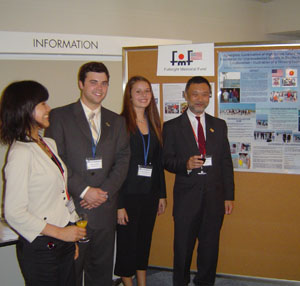 Jason Baker and Ann Durrenberger discussed the training and organization of the student scientist teams. The group's presentations were so professional that they were invited to speak at conferences in Kenya and St. Thomas. |
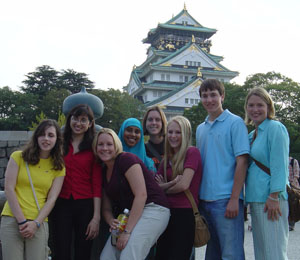 The students were very impressed by the warmth of the Japanese people they encountered both at the conference and in the places they visited. |
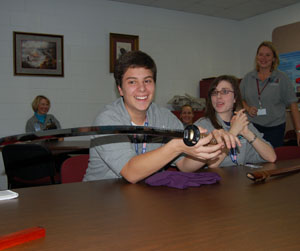 Geoff Simkin shows off his favorite souvenir of the trip: a samurai sword. |
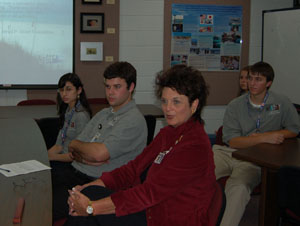 NHS Principal Janie Varner was proud of the way the students handled themselves during the trip. "They were wonderful ambassadors for Niceville and for the US," she said. |
The preparation included weeks of fund-raising, hours and hours of labwork, extensive coordination of multiple teams of student scientists and local officials, the writing and editing of two abstracts. All of the time and effort had to be condensed into a one-hour presentation of their work for a sharp team of Niceville High School students - the youngest presenters at an international environmental science conference in Kyoto, Japan.
The day before the students' presentation, a PhD student had walked out in tears because of the relentless interrogation by a world-renowned scientist.
"The pressure was off the scale," reported teacher Rick Hernandez, co-director of the project. "After all the effort, all the fund-raising, we knew that if we failed in that one hour, it would have devastated the entire project."
The students not only rose to the occasion, they so impressed the conference organizers and the other scientists that they were invited to present their work at conferences in Kenya and St. Thomas. The school's team was also put in charge of creating a website and training any high schools that joined the NaGISA protocol, whose goal is to track the micro and macro-organisms in coastal areas all around the world.
"We were overprepared: our teachers drilled us with every possible question," said senior Jason Baker with a laugh.
NHS Principal Janie Varner was justifiably proud of her students and staff. "They were wonderful ambassadors for Niceville and for the US," she said.
At a press conference Thursday afternoon, the students and teachers shared stories of their experience, as well as their unanimous admiration of the Japanese people they encountered at the conference and throughout their trip.
"I couldn't believe how warm everyone was. It was like you knew them already," said senior Maria Rossi. "I can't think of a single person who wasn't helpful to us."
"The most striking part of the trip was the way people dealt with each other," agreed junior Maryam Mohammed. "Students respect teachers a lot and overall the respect for others was much higher than here."
At the conference itself, the students were accorded the same treatment as the other scientists. Nicholas Stinnett particularly enjoyed networking with scientists from all over the world and having the opportunity to explain their project. "They told us what their problems were and gave us advice about how to solve some of our problems. It was a mutual exchange," he said.
The Niceville delegation was the largest at the convention. Their seriousness and enthusiasm were noticed by the attendees, one of whom referred to them as the "heart" of the convention.
The group's dedication to the project hasn't waned, now that the trip is over. They are interested in recruiting other high schools around Florida to participate in the NaGISA protocol. So far, South Walton and Navarre High Schools are on board for next spring's specimen collection. Hernandez hopes to involve other coastal schools in the project, which has so far seen little participation from the US.
"It's mind-boggling that we're the only ones doing this in Florida," he said.
Other plans for the future include raising money for new equipment - particularly underwater digital cameras, underwater lights and high resolution microscopes. While the group has been very resourceful in stretching their budget - they created their own nets using embroidery rings from Goodwill - some equipment can't be improvised, explained Hernandez.
If you are interested in donating equipment or money to the NaGISA project, please contact Niceville High School at: (850) 833-4114.
![]()
Related Files
:
Related Articles
:
No Related Content
Found